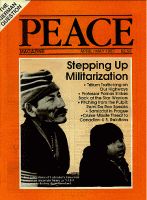
Peace Magazine Apr-May 1987, page 9. Some rights reserved.
Search for other articles by Barry Stevens here
Oliver Stone (director) USA, 1987
Platoon is probably the most hones and moving fiction film ever made about U.S. soldiers in Vietnam. Oliver Stone, who wrote and directed the film, based it on his experience in Vietnam. Stone was previously known for screenplays remarkable for their brutality and purpleness. Platoon also has this B-movie sensibility. The story follows a young recruit, played by Charlie Sheen, as he learns to be a soldier. Along the way, there are conflicts within the platoon, laughs with the entertaining black troops and, of course, plenty of action with a faceless enemy. But the differences stand out. Unlike those old standard "war is hell" pictures, the troop does not pull together when the going gets tough. It falls apart. And the dominant mood is not triumph over fear and the enemy, but horror, terror, and ultimately tragedy.
In the sequence that forms the centre of the film, the platoon, angry over the loss of one of its men and badly scarred, enters a village looking for V.C. Stone has broken the usual character of a tough sergeant with a soft heart into two sergeants, a brute called Barnes and a hero called Elias. In a village, conflict between them (who are like versions of the soul of the U.S.) erupts, as soldiers are permitted to take out their rage in atrocities, including rape and murder. We are not spared much in this scene. You may find yourself begging for it to be over. When finally the platoon commander intervenes, and Sergeant Elias screams at him, "Where were you?", you want to scream with him. The difference between this scene and the attack on the village in Apocalypse Now (a far more brilliant film technically) is like the difference between a war fought from the air and one fought on the ground. On the ground, you have to look at what you've done. The film makes it obvious why the Vietnamese win. They have to. The Americans fall apart because they don't know why they're there. And their officers can't tell them.
There is still plenty to criticize in Platoon; there is bad B-movie dialogue and a pitiful voice-over narration (although the B-movie stuff may be helping people get into the film). There is also a killing at the end which just has no point to it. But you realize what Stone has accomplished when, instead of cueing audiences with exciting battle music, he fills the soundtrack with Samuel Barber's Adagio, perhaps the saddest piece of American classical music. It's as though the film is saying, "Yes, this is what we did, to them and also to ourselves. Maybe now we can look at it in the face, and maybe now we can cry.

Peace Magazine Apr-May 1987, page 9. Some rights reserved.
Search for other articles by Barry Stevens here